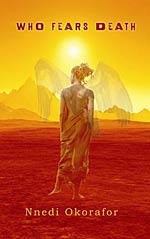
![]() Triseult
Triseult
10/2/2012
![]()
By all accounts I should have liked this book. I really tried to. It's near-future SF/Magic Realism set in Africa, and it's a feminist work at heart. But in the end, I resigned myself to abandoning it midway, saddened that the book failed to deliver with such spectacular potential.
The opening chapters are brutal and relentless, and despite the darkness, they promise a great deal of thought and enlightenment later on. The protagonist, Onyesonwu, is a child of rape, her mother having been savaged by warriors of a rival tribe. This part, though jarring, was incredibly effective, addressing the difficult issue of wartime rape without sugar-coating it nor reveling in it. Within the first fifty pages, Ms. Okorafor has not only dealt with rape, but also with child abuse and female genital mutilation. I braced myself for a tough, dark, and ultimately fulfilling novel set on the African continent.
What happens was a major letdown; it turns out that all of this was basically setting flavor for a coming of age story. You see, Onyesonwu has magical powers from being a child of rape. She meets a sorcerer, who initially refuses to teach her, until she convinces him to do it. When she's done, she sets out on a magical adventure through the desert with a posse, because she's the Chosen One who is supposed to bring peace to the warring tribes of post-apocalyptic Africa.
Wanna know how bad it is? Turns out her father, the rapist, wasn't some random soldier consumed by wartime insanity. No; he is a dark sorcerer, the most powerful of them all, and he will destroy Onyesonwu's people if she doesn't stop him first.
All this, ultimately, cheapens the heavy themes that Ms. Okorafor has chosen to tackle. Onyesonwu's mother's rape, brutal and vivid, becomes a dissonant note in a fairly standard and tired heroic quest. It's like it's there for shock value and verisimilitude, more than to talk about this very real and vile element of war in an illuminating context. If the story of Onyesonwu was removed from its post-apocalyptic African setting, there wouldn't remain much to applaud.
Likewise, I'm not sold on how Ms. Okorafor has elected to portray Africa. I'm not convinced that the themes she chose to explore for Africa (wartime rape, genocide, female genital mutilation, racism) are so much realistic, as they are representative of a distorted Western view of Africa. It's Africa stripped of its culture, its elements of humanity and grace, leaving only the most shocking aspects that make it into the news.
Surely there is a time and place to tackle such dark, important issues. I'm just not sure that a distorted, fantastic Africa filled with evil raping sorcerers and mythical clitoris ablations is the place for it. Perhaps it would have been fine if the bulk of the story had been as unique as its setting; but as it stands, the flatness of the story's structure makes the themes explored hollow and unsatisfying.
Still, two stars for a fantasy novel set elsewhere than a tired Western world, with a strong female protagonist.